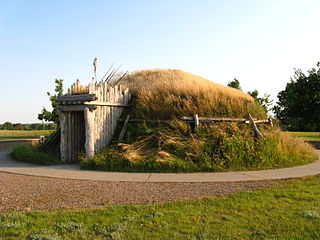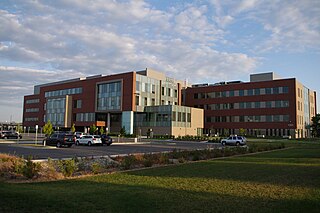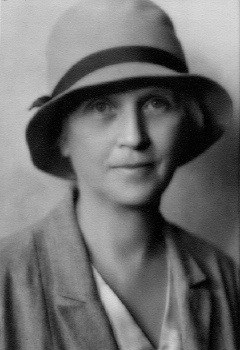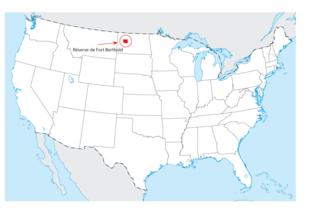Related Research Articles

White Shield is a census-designated place (CDP) lying within the boundaries of the Mandan, Hidatsa, and Arikara Nation. It is located "on" the Fort Berthold Indian Reservation in McLean County, North Dakota, United States. The population was 336 at the 2010 census. It is considered the primary community of the Arikara (Sahnish) people and is named for Chief White Shield.

New Town is a city in Mountrail County, North Dakota. The population was 2,764 at the time of the 2020 census, making it the 18th largest city in North Dakota. New Town was platted in 1950 as a replacement site for the residents of Sanish and Van Hook, as these towns were scheduled to be flooded by the creation of Lake Sakakawea, a reservoir to provide water for irrigation.
The Mandan, Hidatsa, and Arikara Nation, also known as the Three Affiliated Tribes, is a federally recognized Native American Nation resulting from the alliance of the Mandan, Hidatsa, and Arikara peoples, whose Indigenous lands ranged across the Missouri River basin extending from present day North Dakota through western Montana and Wyoming.

The Arikara, also known as Sahnish, Arikaree, Ree, or Hundi, are a tribe of Native Americans in North Dakota and South Dakota. Today, they are enrolled with the Mandan and the Hidatsa as the federally recognized tribe known as the Mandan, Hidatsa, and Arikara Nation.
Mandan is an extinct Siouan language of North Dakota in the United States.

The Knife River Indian Villages National Historic Site, which was established in 1974, preserves the historic and archaeological remnants of bands of Hidatsa, Northern Plains Indians, in North Dakota. This area was a major trading and agricultural area. Three villages were known to occupy the Knife area. In general, these three villages are known as Hidatsa villages. Broken down, the individual villages are Awatixa Xi'e, Awatixa and Big Hidatsa village. Awatixa Xi'e is believed to be the oldest village of the three. The Big Hidatsa village was established around 1600.
Nueta Hidatsa Sahnish College is a public tribal land-grant college in New Town, North Dakota. Chartered by the Three Affiliated Tribes of the Fort Berthold Reservation, the college awards associate and bachelor’s degrees. In addition to its main campus in New Town, the college operates branches in Mandaree and White Shield.
Edward Lone Fight served as Chairman of the Mandan, Hidatsa and Arikara Nation from 1986 to 1990. In 1988 Lone Fight met with President Ronald Reagan, a meeting which was the catalyst for the Just Compensation Bill, introduced based on the findings of the Joint Tribal Advisory Committee, which provided the tribes partial compensation for the flooding of reservation due to the construction of the Garrison Dam under the Pick-Sloan Legislation.

The University of North Dakota School of Medicine and Health Sciences is located in Grand Forks, North Dakota at the University of North Dakota (UND) and is the only school of medicine in the state of North Dakota.
Gilbert Livingston Wilson was an American ethnographer and a Presbyterian minister. He and his brother recorded the lives of three Hidatsa family members; Buffalo Bird Woman, her brother Henry Wolf Chief, and her son Edward Goodbird. Wilson's extensive and detailed writings remain an important source of information for historians and anthropologists, as well as the Hidatsa people.

Sacagawea was a Lemhi Shoshone woman who, in her teens, helped the Lewis and Clark Expedition in achieving their chartered mission objectives by exploring the Louisiana Territory. Sacagawea traveled with the expedition thousands of miles from North Dakota to the Pacific Ocean, helping to establish cultural contacts with Native American people and contributing to the expedition's knowledge of natural history in different regions.

Martha Warren Beckwith was an American folklorist and ethnographer who was the first chair in folklore at any university or college in the U.S.
Alyce Spotted Bear was a Native American educator and politician and an enrolled member of the Mandan, Hidatsa, and Arikara Nation.
Twyla is a feminine given name. Notable people with the name include:
The Northern Intercollegiate Athletic Conference is an independent college athletic conference. The NIAC is made up of ten schools in Minnesota, North Dakota, South Dakota and Manitoba. The NIAC sponsors men's and women's basketball for member institutions.
Barbara K. Charbonneau-Dahlen PhD, RN was an enrolled member of the Turtle Mountain Band of Chippewa Indians. She was a tenured professor of nursing who advocated for indigenous recruitment into the nursing field and fought for those who have experienced sexual abuse. She earned both a Bachelor's and master's degree from University of North Dakota (UND). She completed the Family Nurse Practitioner certification program at UND and earned a doctorate from Florida Atlantic University Christine E. Lynn College of Nursing. She was a professor at Minnesota State University Mankato in the School of Nursing until her passing.

The Sahnish Scouts is a non-profit organization group that responds to the disappearances of indigenous peoples in North Dakota. The group was founded in 2013 by Lissa Yellowbird-Chase, originally in the Bakken oilfields of North Dakota. The Sahnish Scouts publicize missing persons profiles and updates through social media, such as the Sahnish Scouts Facebook and Twitter page, as well as using posters. The Sahnish Scouts have equipment of boats, sonar, ground-penetrating radar, and dogs to use during searches. The organization has helped search and investigate across the Midwest and Northern Plains, Lissa Yellowbird herself having worked on missing cases within North Dakota, South Dakota, Minnesota, Iowa, Montana, Oklahoma, Nebraska, and even California.

Tillie Fay Walker (July 11, 1928 – February 3, 2018), also known as Hishua Adesh (Blossoming Mint), was an American civil rights activist and community leader. She was an enrolled member of the Mandan, Hidatsa, and Arikara Nation. She helped recruit and organize Native American participants in the Poor People's Campaign led by Martin Luther King Jr..
References
- 1 2 3 Baker-Demaray, Twyla B. (2013). Mental health and social engagement among American Indian elders (Ph.D. thesis). University of North Dakota. OCLC 904609344.
- 1 2 3 "Twyla Baker-Demaray". LRInspire. 2013-02-12. Retrieved 2023-08-14.
- 1 2 3 4 5 6 Brandt, Katie Scarlett (2021-02-18). "Strength in Numbers". Native Science Report. Retrieved 2023-08-14.
- 1 2 3 4 5 6 Schill, Shawna (2019-05-15). "American Indian Leaders of Higher Education: Twyla Baker-Demaray". ALL: Master Collection List.
- ↑ Skurzewski, Joe (2020-09-14). "Trio forms Native American Caucus in Dem-NPL party". KFYRTV. Retrieved 2023-08-14.